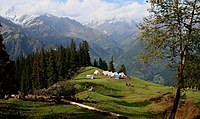
Photo from wikipedia
It is increasingly recognized that interacting with nature promotes well-being and health for both adults and children. Less is known about the role of nature in people's everyday lives during… Click to show full abstract
It is increasingly recognized that interacting with nature promotes well-being and health for both adults and children. Less is known about the role of nature in people's everyday lives during emerging adulthood which means the shift from adolescence to young adulthood. This study examines university students' participation in outdoor recreation and the perceived well-being effects of nature. The qualitative data consists of thematic writings (N = 47) produced by environmental students at the University of Helsinki, Finland, in 2020. The findings show that most students have negotiated time and other constraints and maintained active participation in outdoor recreation. The findings highlight that nature can have an important role in students' well-being during a life stage loaded with stress factors, and especially in times of the COVID-19 pandemic. Nature provides opportunities not only for physical activity but also for emotional and cognitive renewal, strengthening social relationships, and relieving the negative physiological effects of various stressors. Nature helps students in reflecting on their lives and even gaining a stronger sense of self. Natural settings provide a venue for students' socially shared experiences but also support retreat behaviors by enabling ‘being away’ and providing freedom from the pressures of student life. To prevent decline in connection with nature, special efforts should be made to support young adults' interaction with nature and gaining well-being benefits. Encouraging outdoor recreation at all life stages is needed to foster a lifelong nature connection and well-being experiences. Management implications: The study highlights the importance of hearing young adults' voices in decision-making and land-use planning to provide diverse opportunities for outdoor recreation and nature-based tourism. The findings stress the value of urban green spaces in supporting students' well-being in their everyday lives. To provide a sense of extent and ‘being away’ from daily routines and requirements within the city, it is important to preserve slightly managed natural settings that generate opportunities to explore nature and receive multisensory and embodied experiences. Emphasis on multisensory experiences, such as hearing bird song and breathing fresh air, also stresses the importance of taking natural elements into account in all urban planning. Promoting easy access to both urban green spaces and more distant natural settings is important for young adults. Organizing outdoor activities may also help students in familiarizing themselves with green spaces and socializing with peers. © 2021 The Author
Journal Title: Journal of Outdoor Recreation and Tourism
Year Published: 2021
Link to full text (if available)
Share on Social Media: Sign Up to like & get
recommendations!